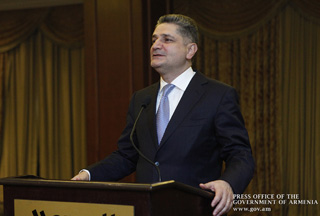What did Tigran Sargsyan not speak about?

Yesterday in Yerevan the third conference on the pension fund was taking place in Yerevan. Prime Minister Tigran Sargsyan was also participating in it.
Wasn’t this the best forum to speak about the perks and benefits of the new reform and devastate the counter-arguments of all opponents on the matter? And so Sargsyan spoke. The text of the speech amounted to 7 pages (A4 format, Sylfaen, fonts 12 and no spaces). This would mean a lengthy speech, which would give an answer to all the questions. The Premier first spoke about the necessity of applying the new reform.
He said that the working group of about half mission people cannot carry the burden of about half million pensioners. He also mentioned that the average life expectancy also grew. It means that the pensioners will be receiving pensions for a longer time. He also spoke about the lack of trust to government, inflation and risks of economy in general. In a word, he spoke about all the matters but kept many of the questions unanswered. The former Premier Hrant Bagratyan had already reached to advert to this speech. Why do we have a society where the number of pensioners is growing higher than the working class? Of course, it can be explained by international motives, change of psychology or social conditions. It is possible but in our case it is a little unfeasible. From Armenia, mostly the working class migrates. The Premier didn’t say anything about this.
The latter said that the government has been preparing to this change starting from 2010. They have raised the salaries and have made savings to provide annually 20 billion AMD to the pension fund. But he didn’t say to what extent inflation rose since 2010. Moreover, he proudly mentioned that for the first time after the crisis in 2013 the government succeeded in overcoming a fundamental issue to ensure that the salaries of the working class are higher than the inflation. “In 2013 the actual rise of salaries amounted to 6,5% and the inflation was 5,8%,” he said and mentioned that the numbers speak of themselves.
The numbers of the National Statistics after corrections really speak of that. This is an extremely convincing argument. The Prime Minister asks how we can solve the issue of pensions when the number of working people is decreasing and the number of pensions will grow in 10-15 years, meaning that we will have more pensioners than workers. But he doesn’t confess that by this reform instead of solving the problem the state puts the burden on the working class. Moreover, the Premier didn’t specify why the government is imposing this reform to citizens if it is such a good one. Neither did he speak about the decision of the Constitutional Court.
The employers still can’t figure whether they should follow the decision of the CC or the arguments of the Premier. And finally the latter mentioned that this reform enables the young people to improve their lives not in 30-40 years but now because now the state will have “long” money and will offer new credits to the youth. This argument is really vague. It turns out that the youth will receive funds at their own expense. And no explanation was provided as to how many of the 275 thousand working youth will have the chance to buy apartments if only 10-15% of their income is given to the state pension fund. There are many unanswered questions.
The space of the newspaper doesn’t allow us to write a long article similar to the Premier’s speech. In such cases people normally say that time will show. The CC will perhaps validate the law and we will have to wait 20-30 years to see what’s actually happening. The first citizen who will benefit from the pension reform will either curse the government or honor it for its past deeds.
By Babken Tunyan

























